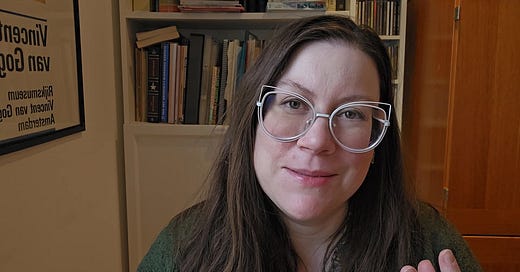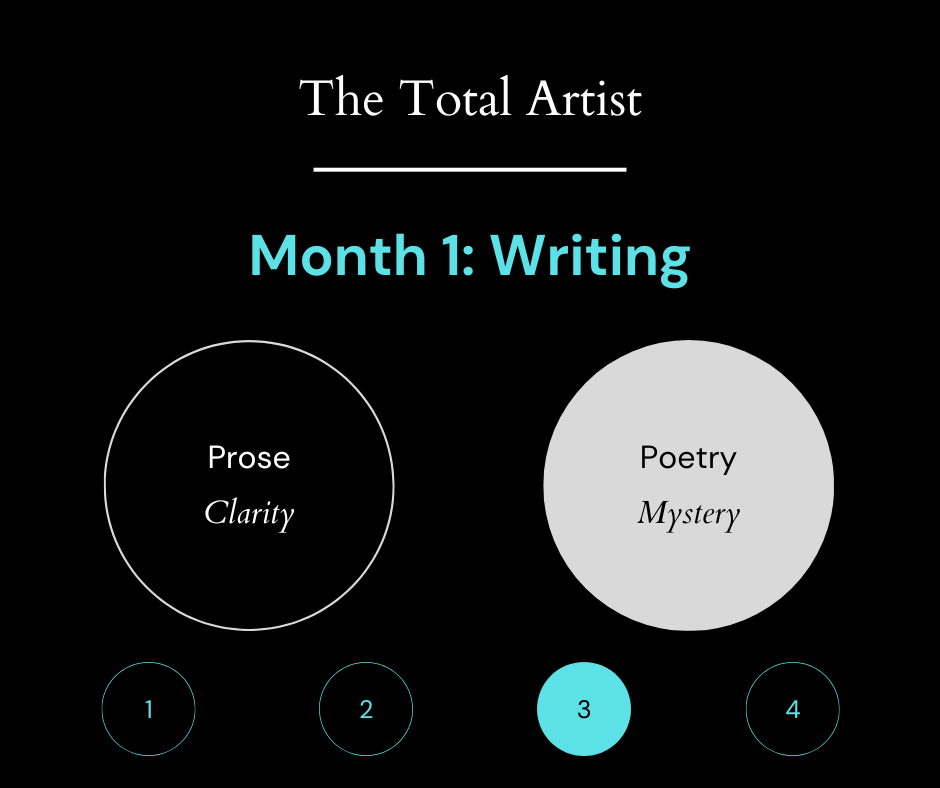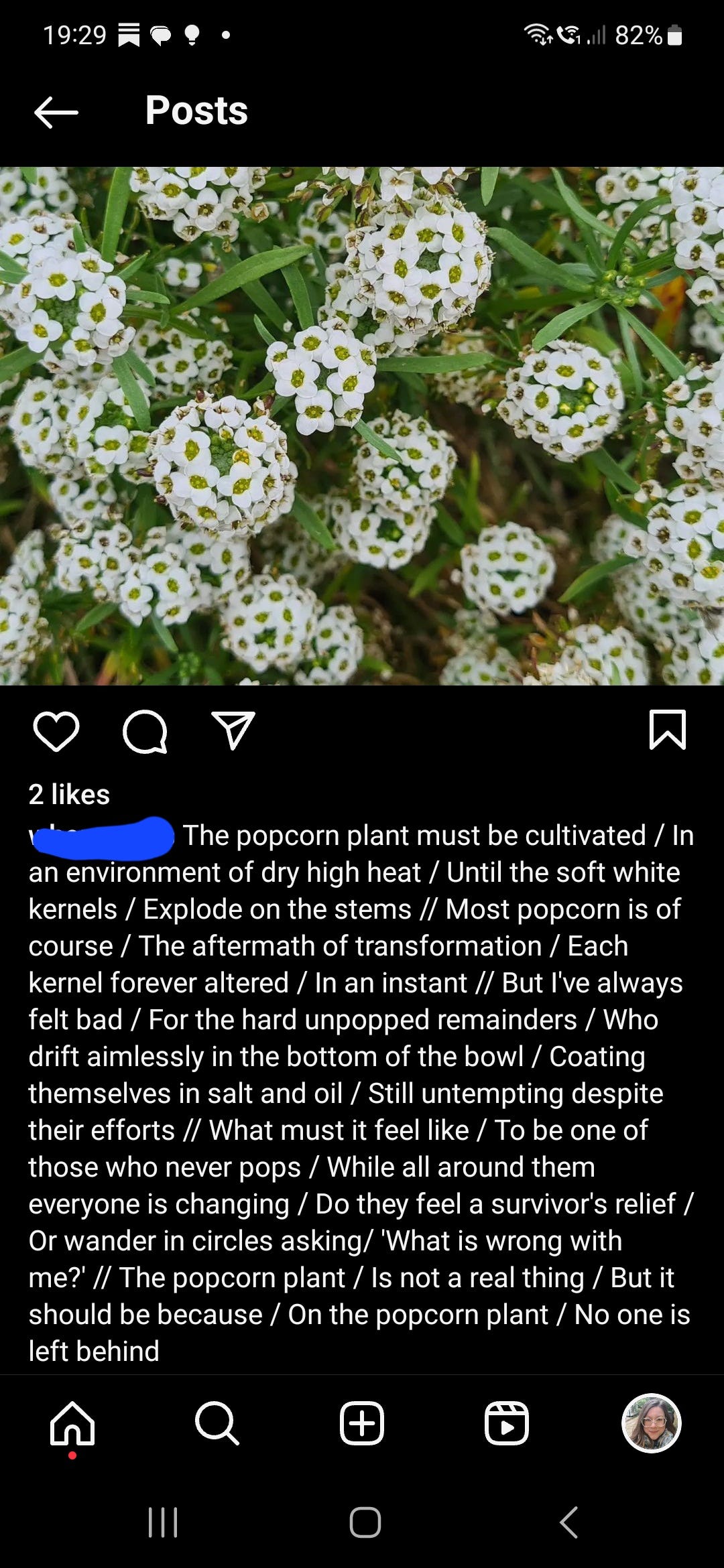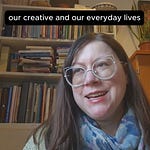Hello friends,
Tonight is the full moon - which couldn’t be more perfect timing to shift our focus to the discipline of poetry and the quality of mystery.
Creative prompt 2: Poetry and Mystery
Your creative task:
Create a piece of poetic writing that taps into your intuition. Take the risk of creating something you do not fully understand.
Your life prompt:
Where is mystery moving through your life? How does it feel to stop looking for explanations for those things?
Project ideas:
If you’re already someone with an existing poetry practice, I would imagine you may already have a challenge in mind.
But if you’re new to this area, don’t be intimidated!
If you want to take a crack at writing a poem but aren’t sure where to start, here are some ideas to try / some things that have worked for me:
Try writing a haiku - these poems are only three lines, consisting of 5 / 7 / 5 syllables. This is where I started, and it’s a great entry point for the poetry-curious!
Make a list of words that sound nice together.
Brainstorm a collection of exciting titles - for a new project at work or a favourite recipe at home.
Draw from everyday life. I like to take the most mundane and unpoetic thing I can think of, and see if I can find something beautiful or meaningful within it. (Example: here is a poem I wrote about defrosting my freezer.)
Create an erasure poem - where you create the poem not by writing words but by crossing them out to find a message in the words that remain. There are some great examples from Austin Kleon. I particularly love Kate Baer’s work, in which she took misogynistic messages sent to her online and found her own powerful messages within them (Bookshop: UK link here; Amazon: UK link here / USA link here).
Let the emotion flow. Is there something you love? Something that makes you furious? See if you can find the words for it.
I have an entire series of poems inspired by learning a new word. I find that writing a poem about it helps me understand the thing and remember the word. (Here’s a new one that I wrote last week as an exercise for the Southbank Poets Collective.)
For me, it’s particularly enjoyable to use a picture as inspiration and write out the idea sand images that come to mind. (You can either use a photo you find, or take them yourself! Here’s an example from my secret instagram. I like to write these on my phone in stream-of-consciousness style in the drowsy last minutes before I fall asleep.)
You can also take the opportunity to connect with poetry in other ways. Maybe you want to read some poetry - either something new, or something from your past - or send a voicenote to a friend with a line that makes you think of them.
Poetry can take so many forms. There will be something out there that speaks your language
Embrace playfulness to uncover mystery
Why does mystery matter?
Well, things get really interesting when I let my unconscious speak. And I know I’m not alone in this.
When we enter a state of flow (in art or life) it can feel like something greater is speaking or working through us. That is a powerful and exhilarating feeling. (Elizabeth Gilbert’s TED talk about the origins of creative genius is amazing for thinking about this.)
We have to be able to welcome into our lives things we cannot explain or fully understand in order to be able to access that experience.
For me, the word ‘mystery’ calls to mind a certain moody, dramatic quality. This can veer towards otherworldly magic, or towards a film noir detective story. One way or another, this feels like serious stuff.
But the essence of mystery is shaking off the rational. Which is why I find:
Mystery and playfulness often sit side by side.
Instead of rewriting, try remixing
Rewriting can be a serious process - often we end up channeling the more analytical and rigorous parts of our creative beings.
But taking a different approach - something that is more open-minded, playful, and collaborative can reveal really interesting things.
A few years ago I had the opportunity to workshop part of a new musical I had been writing called Vanya’s. It’s an adaptation of a classic Chekhov play, reimagined in a Soho jazz club. (Here’s a private link to one of the tracks if you’re curious.)
We had already been chipping away at this project for years, and having the chance to work with actors on the show was an amazing opportunity that I did not want to pass up.
The only problem? I had just begun cancer treatment. There was no way I could be in the rehearsal room, shaping the text and rewriting in the way I normally would.
I had parts of the script written, but some of it was just scenes and fragments. Sections that had been written at different times clashed or didn’t fit together, since I hadn’t yet figured out how to integrate the changes I was making in the story.
Fortunately, I knew I had an outstanding creative team working with me, who would be guiding this process. (Shoutout to my cowriter/composer Bella Barlow, director Franny Anne Rafferty, and music director Joe Bunker.)
I essentially handed over my material, and said here you go! Then at the end of the week, I showed up to see what they had done with it.
The result was extraordinary - there was a fluidity and freedom that hadn’t existed with my words alone. They had moved things around, swapped scenes, gave lines to different characters, and created work that helped me the show in a completely new way. It cracked something open, and helped figure out what the language of the show really was. I wrote the source material, but they found the heart of the show.
I think it’s important to remember that writing does not only happen in isolation. Writing can be a collaborative act!
Remixes are dialogues between artists - a reflection and a response. Also: another way to explore thinking poetically.
But even if you’re someone who is working alone (whether by choice or necessity), you can take a similar approach.
Creating a poetic patchwork
Try revisiting material you’ve already created. (Particularly if there is something you’re not quite satisfied with about it - maybe it feels corny, or overly emotional, or simply dull.)
What happens if you do something radical?
Swap around the beginning and the end of your piece.
Cut your work into pieces to move strips of paper around on the floor can create a fascinating result. (Example: Sheila Heti did this in a fascinating way - alphabetising her diary entries - to me, this transforms the text into a kind of poetry.)
Make yourself a set of strange rules and see what happens if you follow them. Example: delete every third word, pick one sentence to repeat 12 times, replace the names of human people with extinct reptiles - you get the idea!
You might find that in the strange gaps that occur, that mystery creeps in… and so does poetry.
The takeaway
The bigger risks you are willing to take in how you take your piece apart and put it back together again, the more likely you are to end up with something eye-catching, effective, and uniquely you.
Reading a poem together
This is particularly targeted at the folks new to poetry.
You can write something very short, with very simple language, and create something incredibly powerful.
Being ‘poetic’ does not require fancy or complicated artistic choices.
It exists in the space left for the imagination to work.
(A link to the poem: The Red Wheelbarrow by William Carlos Williams)
My project: writing a rainbow
I am embracing the idea of playfulness, and leaning into visual poetry, which isn’t something I have done before in quite this way.
So I’m going to use coloured text to create a rainbow in some way - and also hopefully find a way to question conventional ideas of what we think a rainbow is.
In my personal life, I’m going to be looking out for and cherishing the mysterious, and seeing if there are ways I can spot poetry in all the places it hides within everyday life.
Have fun!
One of my favourite things about working with poetry is that these can be short experiments! (While great poems often have hours, or even years, poured into them, you only need five minutes to come up with something.)
The reward of having a completed piece can come quickly.
And if it all goes terribly wrong, that’s okay. You haven’t invested too much time. So it’s is a great place to try things out, and to make mistakes.
Welcome the mystery! Release the rational! And let those words flow!
For now,
Alli
Access Support: If you have access needs that I’m not currently meeting, please do drop me a line! (The best email is contact@ac-smith.com.) I’d really like to make this project available to anyone who wants to participate















Share this post